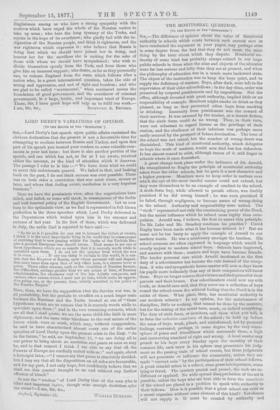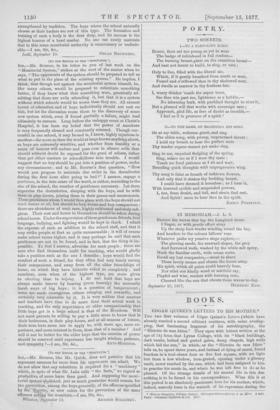THE MONITORIAL QUESTION. [TO THE EDITOR OF THE usrsorAroa."] Siu,—The
difference of opinion about the value of Monitorial authority in schools which exists between such earnest men as have conducted the argument in your pages, may perhaps arise in some degree from the fact that they do not mean the same thing by the term about which they dispute. Monitorial au- thority of some kind has probably always existed in our large public schools in times when the aims and objects of the educator were far le se serious and lofty than they are at present, and when the philosophy of education was in a much more backward state. The object of the institution was to keep the boys quiet, and to supply the deficiency of masters. Boys, after dark, were left to the supervision of their elder schoolfellows; in the day-time, order was preserved by corporal punishments and by impositions. But the office, although invested with great authority, implied little or no responsibility of example. Monitors might smoke or drink as they pleased, as long as they prevented other boys from smoking or drinking. Immunity from punishment was the reward of their services. It was assumed by the master, as a decent fiction, that the sixth form could do no wrong. They, in their turn, were not reluctant to regard license as the privilege of their station, and the obedience of their inferiors was perhaps more easily secured by the prospect of future domination. The tone of the school was not raised, but the number of wrong-doers was diminished. This kind of monitorial authority, which delegates to boys the work of masters, would now find but few defenders. It has almost ceased to exist, although traces of it still linger in schools where it once flourished.
A great change took place under the influence of Dr. Arnold. He transplanted to Rugby the principle of monitorial authority taken from the older schools, but he gave it a new character and a higher purpose. Monitors were to keep order in matters over which the eye of the most careful master could not extend, but they were themselves to be an example of conduct to the school. A sixth-form boy, while allowed to punish others, was doubly punished if he did wrong himself ; he was even punished if he failed, through negligence, to become aware of wrong-doing in the school. Authority and responsibility were united. The " sixth " represented not only the constraining power of the Head, but the moral influence which he valued more highly than com- pulsion. Arnold was, I believe, the first to assert this principle. Do Mr. Lake and Mr. Strachey condemn his practice ? Could Rugby have been made what it has become without it ? But we must not be too hasty to apply the example of Arnold to our modern wants. He was a missionary amongst the heathen. His school sermons are often expressed in language which would be cruelly unjust to modern school boys. Schools have improved, and masters with them ; masters and boys have become friends. The tender personal care which Arnold inculcated as the first duty of a schoolmaster has become the rule instead of the excep- tion. A wise and sympathetic house-master will now-a-days know his pupils more intimately than any of their companions will know them. Boys no longer reserve their virtues and theirgraces for their parents and their homes. Few schoolmasters could now say with truth, as Arnold once said, that they never see a collection of boys round the school-room fire without feeling that the Devil is in the midst of them. What place, then, has monitorial authority in our modern schools ? In my opinion, for the maintenance of discipline, little or nothing, that cannot be done by the masters ; but for the raising of the moral tone, much, or indeed everything. The duty of sixth form, or monitors, call them what you will, is to form the collective conscience of the school ; to hold up before the mass of boys, weak, pliant, and misinformed, led by personal feelings, enervated, perhaps, in some degree by the very atmo- sphere of peace and friendliness which surrounds them, a high and unswerving standard of right and wrong. A head master may preach to his boys every Sunday upon the morality of their common life, each tutor in his sphere may pronounce his judg- ment on the passing train of school events, but these judgments will not penetrate or influence the community, unless they are made "current coin" by the participation of their school-fellows. A great scandal arises in a school, some gross intemperance, some lying or fraud. The masters punish and preach, the mob are in- different or applaud. No wide-spread disapprobation of the act is possible, unless the boys who arc best able to form the conscience of the school are placed in a position to speak with authority to their fellows. How is it possible that a great school can exist as a moral organism without some element of this kind? Yet chance will not supply it. It must be created by authority and
strengthened by tradition. The boys whom the school naturally choose as their leaders are not of this type. The formation and training of such a body is the first duty, and its success is the highest honour of a head master. No one can surely maintain that in this sense monitorial authority is unnecessary or undesir- able.—I am, Sir, &c.,































 Previous page
Previous page